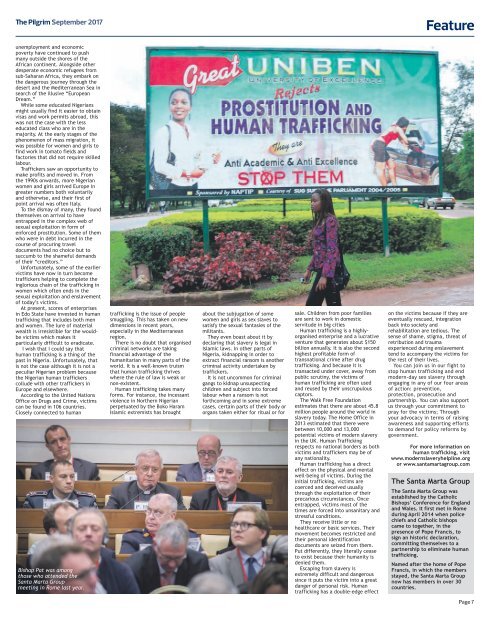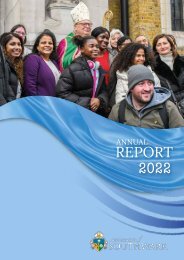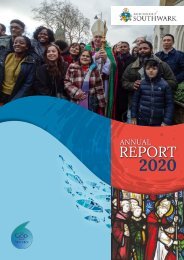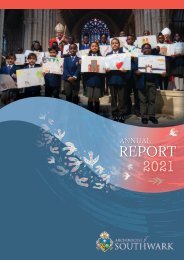Issue 64 - The Pilgrim - September 2017 - The newspaper of the Archdiocese of Southwark
The September 2017 issue of "The Pilgrim", the newspaper of the Archdiocese of Southwark
The September 2017 issue of "The Pilgrim", the newspaper of the Archdiocese of Southwark
You also want an ePaper? Increase the reach of your titles
YUMPU automatically turns print PDFs into web optimized ePapers that Google loves.
<strong>The</strong> <strong>Pilgrim</strong> <strong>September</strong> <strong>2017</strong><br />
Feature<br />
unemployment and economic<br />
poverty have continued to push<br />
many outside <strong>the</strong> shores <strong>of</strong> <strong>the</strong><br />
African continent. Alongside o<strong>the</strong>r<br />
desperate economic refugees from<br />
sub-Saharan Africa, <strong>the</strong>y embark on<br />
<strong>the</strong> dangerous journey through <strong>the</strong><br />
desert and <strong>the</strong> Mediterranean Sea in<br />
search <strong>of</strong> <strong>the</strong> illusive “European<br />
Dream.”<br />
While some educated Nigerians<br />
might usually find it easier to obtain<br />
visas and work permits abroad, this<br />
was not <strong>the</strong> case with <strong>the</strong> less<br />
educated class who are in <strong>the</strong><br />
majority. At <strong>the</strong> early stages <strong>of</strong> <strong>the</strong><br />
phenomenon <strong>of</strong> mass migration, it<br />
was possible for women and girls to<br />
find work in tomato fields and<br />
factories that did not require skilled<br />
labour.<br />
Traffickers saw an opportunity to<br />
make pr<strong>of</strong>its and moved in. From<br />
<strong>the</strong> 1990s onwards, more Nigerian<br />
women and girls arrived Europe in<br />
greater numbers both voluntarily<br />
and o<strong>the</strong>rwise, and <strong>the</strong>ir first <strong>of</strong><br />
point arrival was <strong>of</strong>ten Italy.<br />
To <strong>the</strong> dismay <strong>of</strong> many, <strong>the</strong>y found<br />
<strong>the</strong>mselves on arrival to have<br />
entrapped in <strong>the</strong> complex web <strong>of</strong><br />
sexual exploitation in form <strong>of</strong><br />
enforced prostitution. Some <strong>of</strong> <strong>the</strong>m<br />
who were in debt incurred in <strong>the</strong><br />
course <strong>of</strong> procuring travel<br />
documents had no choice but to<br />
succumb to <strong>the</strong> shameful demands<br />
<strong>of</strong> <strong>the</strong>ir “creditors.”<br />
Unfortunately, some <strong>of</strong> <strong>the</strong> earlier<br />
victims have now in turn become<br />
traffickers helping to complete <strong>the</strong><br />
inglorious chain <strong>of</strong> <strong>the</strong> trafficking in<br />
women which <strong>of</strong>ten ends in <strong>the</strong><br />
sexual exploitation and enslavement<br />
<strong>of</strong> today’s victims.<br />
At present, scores <strong>of</strong> enterprises<br />
in Edo State have invested in human<br />
trafficking that includes both men<br />
and women. <strong>The</strong> lure <strong>of</strong> material<br />
wealth is irresistible for <strong>the</strong> wouldbe<br />
victims which makes it<br />
particularly difficult to eradicate.<br />
I wish that I could say that<br />
human trafficking is a thing <strong>of</strong> <strong>the</strong><br />
past in Nigeria. Unfortunately, that<br />
is not <strong>the</strong> case although it is not a<br />
peculiar Nigerian problem because<br />
<strong>the</strong> Nigerian human traffickers<br />
collude with o<strong>the</strong>r traffickers in<br />
Europe and elsewhere.<br />
According to <strong>the</strong> United Nations<br />
Office on Drugs and Crime, victims<br />
can be found in 106 countries.<br />
Closely connected to human<br />
Bishop Pat was among<br />
those who attended <strong>the</strong><br />
Santa Marta Group<br />
meeting in Rome last year.<br />
trafficking is <strong>the</strong> issue <strong>of</strong> people<br />
smuggling. This has taken on new<br />
dimensions in recent years,<br />
especially in <strong>the</strong> Mediterranean<br />
region.<br />
<strong>The</strong>re is no doubt that organised<br />
criminal networks are taking<br />
financial advantage <strong>of</strong> <strong>the</strong><br />
humanitarian in many parts <strong>of</strong> <strong>the</strong><br />
world. It is a well-known truism<br />
that human trafficking thrives<br />
where <strong>the</strong> rule <strong>of</strong> law is weak or<br />
non-existent.<br />
Human trafficking takes many<br />
forms. For instance, <strong>the</strong> incessant<br />
violence in Nor<strong>the</strong>rn Nigerian<br />
perpetuated by <strong>the</strong> Boko Haram<br />
Islamic extremists has brought<br />
about <strong>the</strong> subjugation <strong>of</strong> some<br />
women and girls as sex slaves to<br />
satisfy <strong>the</strong> sexual fantasies <strong>of</strong> <strong>the</strong><br />
militants.<br />
<strong>The</strong>y even boast about it by<br />
declaring that slavery is legal in<br />
Islamic laws. In o<strong>the</strong>r parts <strong>of</strong><br />
Nigeria, kidnapping in order to<br />
extract financial ransom is ano<strong>the</strong>r<br />
criminal activity undertaken by<br />
traffickers.<br />
It is not uncommon for criminal<br />
gangs to kidnap unsuspecting<br />
children and subject into forced<br />
labour when a ransom is not<br />
forthcoming and in some extreme<br />
cases, certain parts <strong>of</strong> <strong>the</strong>ir body or<br />
organs taken ei<strong>the</strong>r for ritual or for<br />
sale. Children from poor families<br />
are sent to work in domestic<br />
servitude in big cities<br />
Human trafficking is a highlyorganised<br />
enterprise and a lucrative<br />
venture that generates about $150<br />
billion annually. It is also <strong>the</strong> second<br />
highest pr<strong>of</strong>itable form <strong>of</strong><br />
transnational crime after drug<br />
trafficking. And because it is<br />
transacted under cover, away from<br />
public scrutiny, <strong>the</strong> victims <strong>of</strong><br />
human trafficking are <strong>of</strong>ten used<br />
and reused by <strong>the</strong>ir unscrupulous<br />
captors.<br />
<strong>The</strong> Walk Free Foundation<br />
estimates that <strong>the</strong>re are about 45.8<br />
million people around <strong>the</strong> world in<br />
slavery today. <strong>The</strong> Home Office in<br />
2013 estimated that <strong>the</strong>re were<br />
between 10,000 and 13,000<br />
potential victims <strong>of</strong> modern slavery<br />
in <strong>the</strong> UK. Human Trafficking<br />
respects no national borders as both<br />
victims and traffickers may be <strong>of</strong><br />
any nationality.<br />
Human trafficking has a direct<br />
effect on <strong>the</strong> physical and mental<br />
well-being <strong>of</strong> victims. During <strong>the</strong><br />
initial trafficking, victims are<br />
coerced and deceived usually<br />
through <strong>the</strong> exploitation <strong>of</strong> <strong>the</strong>ir<br />
precarious circumstances. Once<br />
entrapped, victims most <strong>of</strong> <strong>the</strong><br />
times are forced into unsanitary and<br />
stressful conditions.<br />
<strong>The</strong>y receive little or no<br />
healthcare or basic services. <strong>The</strong>ir<br />
movement becomes restricted and<br />
<strong>the</strong>ir personal identification<br />
documents are seized from <strong>the</strong>m.<br />
Put differently, <strong>the</strong>y literally cease<br />
to exist because <strong>the</strong>ir humanity is<br />
denied <strong>the</strong>m.<br />
Escaping from slavery is<br />
extremely difficult and dangerous<br />
since it puts <strong>the</strong> victim into a great<br />
danger <strong>of</strong> personal risk. Human<br />
trafficking has a double-edge effect<br />
on <strong>the</strong> victims because if <strong>the</strong>y are<br />
eventually rescued, integration<br />
back into society and<br />
rehabilitation are tedious. <strong>The</strong><br />
sense <strong>of</strong> shame, stigma, threat <strong>of</strong><br />
retribution and trauma<br />
experienced during enslavement<br />
tend to accompany <strong>the</strong> victims for<br />
<strong>the</strong> rest <strong>of</strong> <strong>the</strong>ir lives.<br />
You can join us in our fight to<br />
stop human trafficking and end<br />
modern-day sex slavery through<br />
engaging in any <strong>of</strong> our four areas<br />
<strong>of</strong> action: prevention,<br />
protection, prosecution and<br />
partnership. You can also support<br />
us through your commitment to<br />
pray for <strong>the</strong> victims; Through<br />
your advocacy in terms <strong>of</strong> raising<br />
awareness and supporting efforts<br />
to demand for policy reforms by<br />
government.<br />
For more information on<br />
human trafficking, visit<br />
www.modernslaveryhelpline.org<br />
or www.santamartagroup.com<br />
<strong>The</strong> Santa Marta Group<br />
<strong>The</strong> Santa Marta Group was<br />
established by <strong>the</strong> Catholic<br />
Bishops’ Conference for England<br />
and Wales. It first met in Rome<br />
during April 2014 when police<br />
chiefs and Catholic bishops<br />
came to toge<strong>the</strong>r, in <strong>the</strong><br />
presence <strong>of</strong> Pope Francis, to<br />
sign an historic declaration,<br />
committing <strong>the</strong>mselves to a<br />
partnership to eliminate human<br />
trafficking.<br />
Named after <strong>the</strong> home <strong>of</strong> Pope<br />
Francis, in which <strong>the</strong> members<br />
stayed, <strong>the</strong> Santa Marta Group<br />
now has members in over 30<br />
countries.<br />
Page 7


















